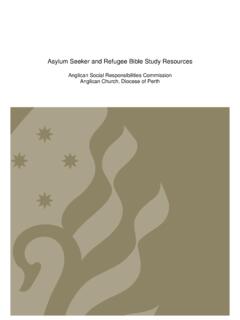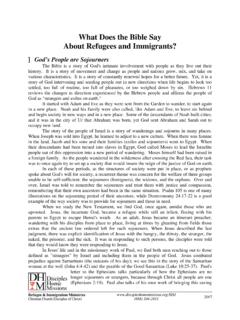Transcription of BIBLE STUDY - Christian Alliance for Orphans
1 BIBLE STUDYA BRIEF BIBLE STUDY ON UNACCOMPANIED CHILDRENA Brief BIBLE STUDY on Unaccompanied Children Page | 1 A Brief BIBLE STUDY on Unaccompanied Children What does the BIBLE say about unaccompanied refugee children? Here are four biblical passages that resonate with unaccompanied child issues, and might point us forward to action. Consider reading each passage and the associated commentary below with your small group and then discussing the Reflection Points. Or use this as a personal journey through God s word and journal your thoughts on each verse and its associated commentary as well as your responses to the Reflection Points. A command of love (Deut. 10:17-19) The call to show love and justice towards the marginalised is here depicted as a response both to God s own character but also to Israel s own outsider experience in Egypt. Caring for the marginalised and vulnerable is a reflection of who God is and what he is committed to. If that was not sufficient motivation for Israel, their memory should also fuel their compassion and solidarity.
2 They knew as a people what it was like to receive hospitality and they knew what it was like to be subject to hostility. Now that they were about to be given a land of their own and were about to become potential hosts , they must carry out their God-reflecting responsibilities towards the outsider and the A song of complaint (Psalm 10) In this lesser known Psalm, the author expresses his distress when looking around the world and seeing God s seeming inactivity on behalf of the vulnerable. It is a complaint on behalf of those suffering at the hands of the wicked and, for those who would prefer to look away, acts as a call to insistent attentiveness to the plight of the exploited. It seems particularly apposite when considering the exploitation of children caught up in the refugee crisis. Consider, for example, vv. 7-11 with its description of the exploitative practices of the wicked who breathe out lies and threats, lie in wait for their helpless victims, and exert their power over those with no way out.
3 No wonder the psalmist cries out for God to arise and show that he does indeed reign (v. 12). As illustrated above, accounts coming out of the refugee crisis can leave us overwhelmed and unable to process the exploitative evil being committed. Psalm 10 gives us a language for beginning this processing and advocacy work on behalf of these children. A story of hope (2 Kings 5:1-14) This story features Naaman, a great and accomplished Syrian general who is cured of a skin disease through an encounter with the prophet Elisha. While most of the narrative focused on the (at times faulty and imprudent) attitudes and actions of adults, the entire episode hangs on the words of a trafficked child. This nameless young girl has been taken captive from her home in Israel by Syrian raiding parties and set to work for Naaman s wife. Knowing of his skin disease, the girl expresses a wish to her mistress that Naaman could be with Israel s prophet, who would surely heal him of his disease.
4 As the story unfolds, her word is taken seriously and this leads to Naaman encountering Elisha, being healed and having some kind of conversion experience to faith in Yahweh and this all because of the word of a powerless little girl who is forgotten as the narrative progresses. 1 Peter Craigie, The Book of Deuteronomy, NICOT (Eerdmans, 1976), 206-207. A Brief BIBLE STUDY on Unaccompanied Children Page | 2 She is a nameless spoil of war, caught up in events far beyond her control: plundered from home and family, enslaved in an alien, enemy land. Who knows what has happened to her and many others like her? Esther Menn reflects on the story powerfully: In the big world into which the conflict between Israel and Syria has forced her as an enslaved captive of war, the child is introduced simply as little , as if that is the one thing that matters, her smallness in the midst of everything mighty, powerful, and gross.
5 2 She later points to the story as pointing to the vulnerability of children of all ages, who are caught up in the violence and upset of communal or national conflicts. 3 The story is sobering both in the way that it depicts with almost brutally concise matter-of -factness the dire circumstances of the girl, yet at the same time exemplifies how God finds ways of bringing about his purposes through people in the most unpromising of circumstances. This is perhaps best illustrated in our final text. The unignorable early life of Jesus (Matt. 2:13-15) Occurring only in Matthew s Gospel, these three verses would be easy to pass over in the midst of the broader narrative of Jesus infancy. Without wanting to appear flippant in any way, it seems clear that Jesus early life has more parallels with a child of a refugee family fleeing ISIS that with most children born in Western Europe. In historical and global terms, Jesus early life is much closer to the norm of humanity than our own; indeed, closer than we would like to admit.
6 This concise narrative leaves a variety of unanswered questions surrounding the family s destination and experience in Egypt. Is it possible, for example, that Jesus earliest memories were of the hardship and hospitality they encountered during their flight to a foreign land? This experience of Jesus seems important and has profound implications for the Church s disposition towards and approach to refugee issues. Krish Kandiah s poignant and provocative assertion is worth quoting at length: Jesus was a refugee. The Son of God was an asylum-seeker. The Prince of Peace went on the run from a brutal and merciless regime, crossing borders to find sanctuary. How can those of us who call ourselves Christians, who claim to belong to a Christian country, not welcome those who follow in Jesus footsteps as a refugee?.. We prefer a civilised Jesus, a respectable establishment type who will comfort us, protect us and promise that all our dreams will come true. The real Jesus is a threat to our ambitions.
7 Are we more like Herod than we d like to admit? If there is no room for the outcast, vulnerable, poverty-stricken refugee Jesus in our lives, then we have to get rid of the other outcast, vulnerable, poverty-stricken refugees he associates with: collateral damage in our bid to protect a ruling position we are unwilling to budge We worship a God who came not in riches, glory, comfort or majesty but was born in the midst of scandal, military and political oppression, and a death sentence. God met the pain of the world head on by entering into it as a helpless baby, dependent on two young parents who had to flee for their lives to another country. Embedded into this story, our story, the God whom we serve became a helpless, adopted refugee. But this, of course, leads to hope as well. Out of these unpromising beginnings God unleashed the transforming power of the gospel. 2 Esther Menn, Child Characters in Biblical Narratives , in Marcia J.
8 Bunge, ed., The Child in the BIBLE (Eerdmans, 2008), 343. 3 Menn, Child Characters , 351 4 Kandiah, God is Stranger, 231. A Brief BIBLE STUDY on Unaccompanied Children Page | 3 Reflection Points These brief biblical reflections provoke a range of questions that churches might consider. These include: To what extent is our disposition towards the vulnerable and displaced other shaped by God s character and calling, by gratitude, generosity, and solidarity? How can we use the biblical language of complaint to lament on behalf of these children, and move from lament to action? Will we be attentive to those passages of the BIBLE that speak of the vulnerability and suffering of displaced children? Will we see the refugee Jesus? Will we be attentive to the ways in which God brings hope and brings about his purposes through overwhelming and desperate circumstances? This BIBLE STUDY is an excerpt from Ethics in Brief: Unaccompanied Asylum Seeking Children: Shaping a Church Response published by The Kirby Laing Institute for Christian Ethics in Summer 2017.
9 The Brief was authored by Dr. Tim Davy and Mark Walley. Dr Tim Davy is Research Fellow and Lecturer in Biblical Studies & Mission at Redcliffe College, Gloucester. He also leads Redcliffe s research project, Meeting the Needs of Unaccompanied Asylum Seeking Children (UASC) in Gloucestershire: Enhancing the Response of the Local Church , which is funded by the Diocese of Gloucester Development Fund. Mark Walley runs Home for Good s unaccompanied minors project alongside establishing its political advocacy work. In autumn 2017 he begins ordination training in the Church of England. You can download the full brief here.









